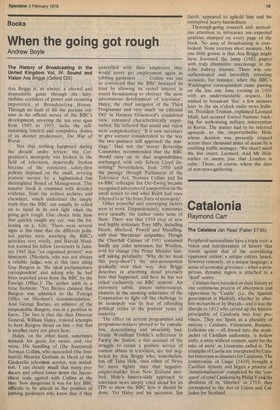When the going got rough
Andrew Boyle
The History of Broadcasting in the United Kingdom Vol. IV: Sound and Vision Asa Briggs (Oxford £25) Asa Briggs is, as always, a shrewd and dependable guide through the labyrinthine corridors of power and recurring impotence at Broadcasting House. Through no fault of his the present volume in his official survey of the BBC's development, covering the ten year span from 1945 to 1955, lacks the selfsustaining interest and compulsive drama of its shorter predecessor, The War of Words.
Not that nothing happened during the decade under review: the Corporation's monopoly was broken in the field of television, deservedly broken because of the restrictive safety-first policies imposed on the small, reviving postwar service by a highminded but shortsighted Board of Management. This massive book is crammed with detailed evidence, from the written archives and elsewhere, which underlines the simple truth that the BBC can usually be relied on to stand in its own light when the going gets rough. One choice little item that quickly caught my eye was the following on p. 620: 'There were several signs at this time that the different political parties were watching the BBC's activities very warily, and Harold Nicolson warned his fellow Governors in January 1945 that "an organised protest" was imminent. (Nicolson, who was not always a reliable judge, was at this time citing Guy Burgess as 'the ideal parliamentary correspondent' and asking why he had been snatched away from the BBC by the Foreign Office.)' The author adds in a terse footnote: 'Yet Barnes claimed that Burgess was admitted to the Foreign Office on Nicolson's recommendation.' And George Barnes, an admirer of the unspeakable Burgess, was in a position to know. The fact is that the then Director General, William Haley, resisted attempts to have Burgess thrust on him — but that is another story not given here.
Haley, on the other hand, sometimes mistook his geese for swans, and vice versa. His handling of (the frustrated) Norman Collins, who succeeded (the frustrated) Maurice Gorham as Head of the Cinderella television service, was maladroit. I can clearly recall that many producers and others lower down the hierarchical scale agreed with Collins at the time 'how dangerous it was for key BBC officials to be placed in the position of jobbing gardeners who knew that if they quarrelled with their employers they would never get employment again as jobbing gardeners . . . ' Collins was just as convinced that the BBC betrayed its trust by allowing its vested interest in sound broadcasting to obstruct 'the most adventurous development of television'. Haley, the chief instigator of the Third Programme and very much 'an editorial DG' in Harman Grisewood's considered view, remained characteristically unperturbed. He believed that sound and vision were complementary: 'It is now necessary to give earnest consideration to the way the two partners will approach the marriage.' Had not the recent Beveridge Committee recommended that the BBC should carry on its dual responsibilities, unchanged, with only Selwyn Lloyd dissenting? Nevertheless, from 1950 until the passage through Parliament of the Television Act, Norman Collins and his ex-BBC colleague Ian Orr-Ewing became recognised advocates of competition on the small screen to end what Reith had once referred to as 'the brute force of monopoly'.
Other powerful and converging factors were at work. Dispassionately, sometimes even casually, the author omits none of them. There was that 1950 crop of new and highly articulate Tory MPs, including Heath, Macleod, Powell and Maudling, with their 'libertarian' antipathies. Though the Churchill Cabinet of 1951 contained hardly any elder statesmen, bar Woolton, avid for change (the Prime Minister himself asking petulantly: 'Why do we need this peep-show?') the anti-monopolists gradually won their way. Asa Briggs describes in absorbing detail precisely how that happened; and here he has not relied exclusively on BBC sources. An extremely subtle, almost subterranean, element in the seeming reluctance of the Corporation to fight off the challenge to its monopoly was its fear of offending political critics in the postwar years of austerity.
The effect on certain programmes and programme-makers proved to be cumulative, demoralising and invariably bad. Grade Wyndham Goldie's reflections in Facing the Nation, a fair account of the struggle to create a positive service of current affairs in television, are not neglected by Asa Briggs who, nonetheless, lets off Tahu Hole, then editor of News, far more lightly than that negativeempire-builder from New Zealand merited. Hole's lantern-slide approach to television news simply cried aloud for an ITN to show the BBC how it should be done. Yet Haley and his successor, Ian Jacob, appeared to uphold him and his uninspired heavy-handedness.
Thorough-going research and meticulous attention to intricacies are expected qualities stamped on every page of the book. No area of broadcasting is overlooked. None receives short measure. My one little grouse is that Asa Briggs might have leavened the lump (1082 pages) with truly illustrative anecdotage in the John Aubrey manner. There was one authenticated and incredibly revealing occasion, for instance, when the BBC's Washington correspondent came panting on the line one June evening in 1950 with an understandable request. He wished to broadcast live' a few minutes later in the six o'clock radio news bulletin. President Truman, explained Leonard Miall, had secured United Nations' backing for authorising military intervention in Korea. The matter had to be referred upwards to the imperturbable Hole whose decision was presently relayed across three thousand miles of ocean by a soothing traffic manager: 'We shan't need the live insert, Leonard. And Mr Hole wishes to assure you that London is calm.' Those, of course, where the days of non-news-gathering.


































 Previous page
Previous page